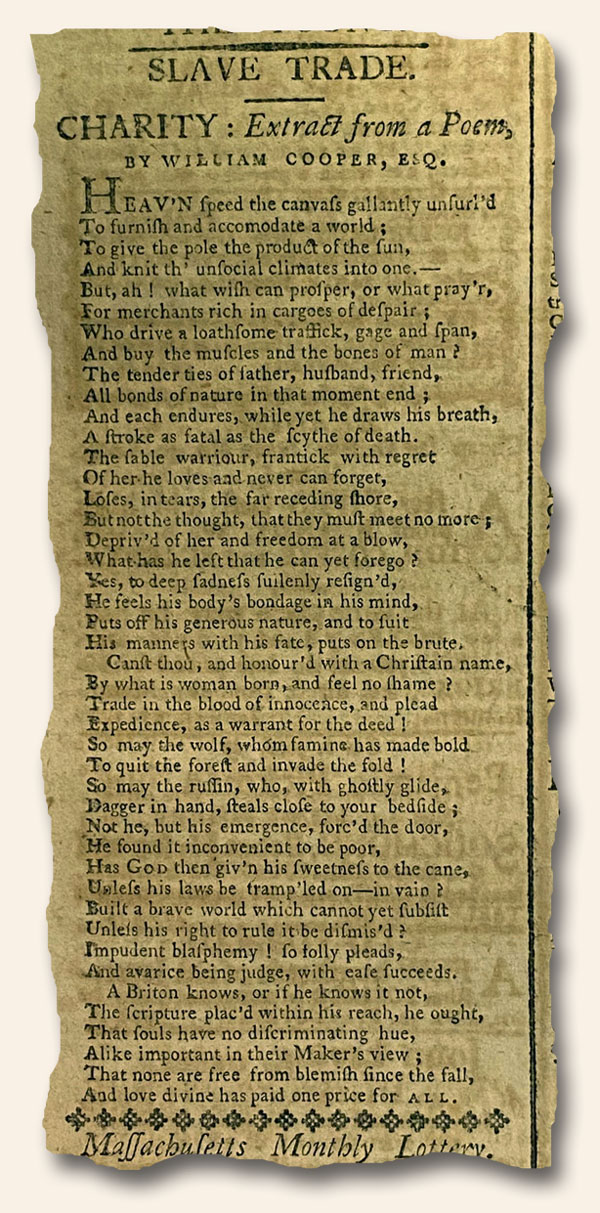Last words can say it all – John Hancock’s thankful heart… Happy Thanksgiving!
November 11, 2021 by Laura Heilenman · Leave a Comment
Food for thought as we wish each other a Happy Thanksgiving.
What do the following sayings have in common: “A man’s last words reflect what he held most dear”… “He finished well”… “He ran with perseverance the race set before him”?
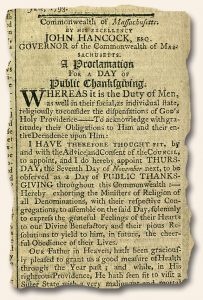
I would argue, based on a fascinating issue of the Columbian Centinel (Oct. 9, 1793) I found today, they are all applicable to John Hancock. What began as intrigue with a Proclamation for a Day of Thanksgiving by this notable Founding Father, turned to a swell of warmth as I noticed his death announcement within the same issue. At the end of his life, he was clearly focused on giving thanks: “Where as it is the Duty of Men, as well in their social, as individual state, religiously to consider the dispensation of God’s Holy Providence – To acknowledge with gratitude, their obligations to Him and their entire dependence upon Him: I have therefore thought fit, by and with Advice and Confident of the the council, to appoint, and I do hereby appoint Thursday, the Seventh Day of November next, to be observed as a Day of Public Thanksgiving throughout this Commonwealth…”
His well-run race, punctuated by an abundance of highlights along the way, stands as an emphatic reminder to never take thankfulness for granted. While it is easy to assume gratitude has always been in the hearts of men, truth is, its more rare than one would hope and needs to be proclaimed more often. In John Hancock’s case, his words and deeds proclaimed the overflow of his heart long before he signed off on this life and entered the next.
Snapshot 1801… The importance of newspapers…
November 4, 2021 by GuyHeilenman · Leave a Comment
In 1803 the well-respected Columbian Centinel and Massachusetts Federalist dated August 19, 1801 printed an article affirming a new publication, the Country Gazette of the United States (Philadelphia), and made a powerful statement regarding the importance of newspapers which we have shown below. This declaration is reflective of new president Thomas Jefferson’s comments regarding newspapers from back in the late 1780’s:
“The people are the only censors of their governors: and even their errors will tend to keep these to the true principles of their institution. To punish these errors too severely would be to suppress the only safeguard of the public liberty. The way to prevent these irregular interpositions of the people is to give them full information of their affairs thro’ the channel of the public papers, & to contrive that those papers should penetrate the whole mass of the people. The basis of our governments being the opinion of the people, the very first object should be to keep that right; and were it left to me to decide whether we should have a government without newspapers or newspapers without a government, I should not hesitate a moment to prefer the latter. But I should mean that every man should receive those papers & be capable of reading them.”
If either the publisher of the Columbian Centinel or Thomas Jefferson were alive today, do you think they’d feel the same? Please share your thoughts.
They put it in print, 1917 – “The more things change…”
October 4, 2021 by GuyHeilenman · Leave a Comment
A recent post focused on a headline which borrowed Jean-Baptiste Alphonse Karr’s famous words from 1849: “the more things change, the more they stay the same” (translated from “plus ça change, plus c’est la même chose”). This tendency, as applied to human behavior, has certainly been substantiated time and time again in the world of politics.
During former President Trump’s term in office “leaks” were springing up everywhere. For a novice to the political realm this may have appeared to have been a new phenomenon; however, the banner headline from a San Diego Evening Tribune dated January 8, 1917 makes it clear that once again, Jean-Baptiste Alphonse Karr was spot-on. How do we know? They put it in print: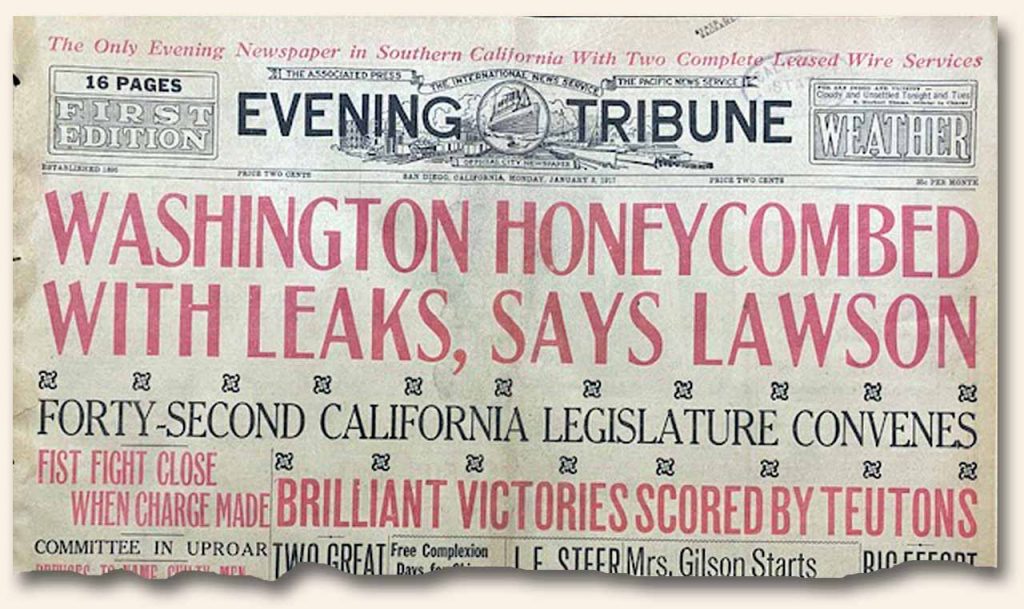
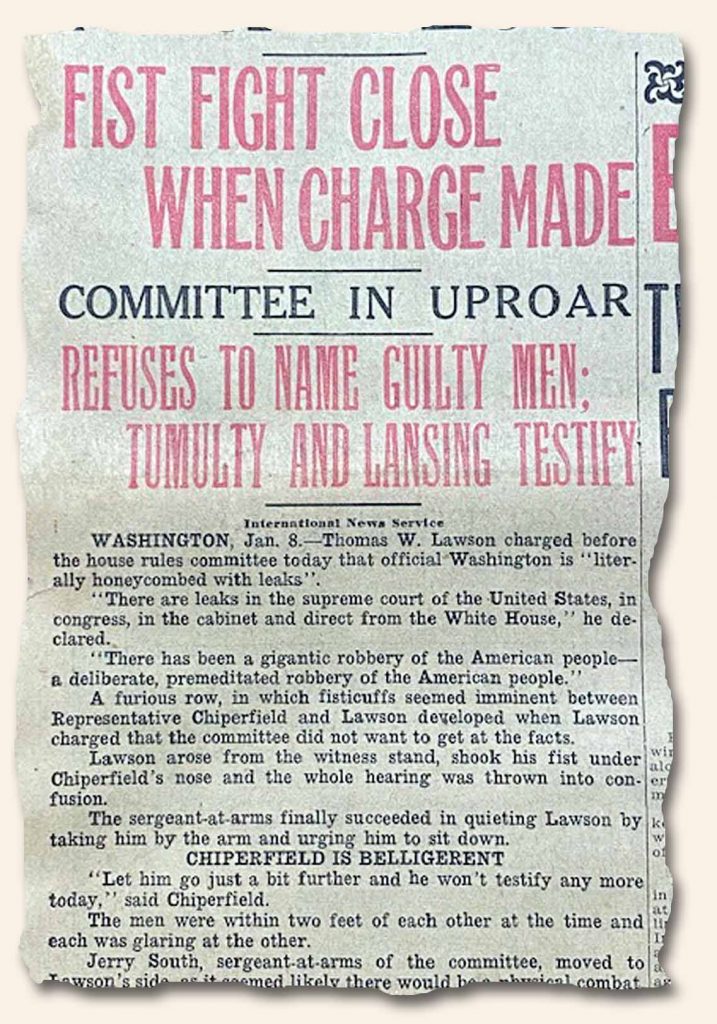
18th Century Gentleman’s Magazines – So Much For So Little…
July 16, 2021 by GuyHeilenman · Leave a Comment
Over 40 years ago we discovered one of the best titles of the 18th century for period news reporting. The title wasn’t even a newspaper but rather, “The Gentleman’s Magazine” from London.
Having begun in 1731, Gentleman’s Magazines ran uninterrupted for nearly 200 years publishing pages capturing news reports concerning America which could never be found in period American newspapers, and were rarely found in period British newspapers.
 From its earliest years this popular title printed reports as varied as the creation of the colony of Georgia, William Penn laying out the city of Philadelphia, slave revolts, and reports of pirates operating in the Caribbean.
From its earliest years this popular title printed reports as varied as the creation of the colony of Georgia, William Penn laying out the city of Philadelphia, slave revolts, and reports of pirates operating in the Caribbean.
Issues have much on Ben Franklin & his work with electricity including the lightening rod & famous kite experiments as well as rarely published poems by the famed slave poet Phyllis Wheatley.
Death reports of the famous–and infamous–abound, from Mozart to Handel, from John Paul Jones to George Washington, Patrick Henry and Benedict Arnold… the list is awe inspiring.
Military events are abundant including much on the French & Indian War (with very early Colonel George Washington reports) & all the Revolutionary War battles from the Boston Massacre through the Treaty of Peace.
Keep in mind the American colonies were part of the global British Empire until 1776 so there was much interest in not only American events but notable world events which affected the broad scope of British interests.
Some of the best gems to be found are very inconspicuous reports such as the hanging of what would famously become known as the Liberty Bell. Under the heading: “America” and with a “Philadelphia, May 10” dateline from 1753 is a report reading: “Last week was raised and fixed, in the State-House Steeple, the great bell, weighing 2080 lb. cast here, with this inscription, ‘Proclaim liberty throughout all the land, to the inhabitants thereof.”
The full text of the hated Stamp Act is found within the pages of a Gentleman’s Magazine, and just one year later is found the formal repeal of the Stamp Act by King George III. Other Acts of Parliament harmful to colonial relations are reported as well.
Historic documents are certainly not lacking, among them being the Articles of Confederation, the “Causes & Necessity for Taking Up Arms”, the Constitution of the United States (in 1787), and the most desired document of all, the Declaration of Independence.
At a time when an early period printing of the Declaration in an American newspaper will sell for a half a million dollars or more, the ability to purchase a 1776 magazine with a timely printing of the full text of the document for under $4000 is a rare opportunity for any collector.
An added bonus found in many issues of Gentleman’s Magazine is that while plates and maps can simply not be found in newspapers of the 18th century, this wonderful publication contains a wealth of these engravings and wood-cut prints.
Printed separately from the regular pages of the issue and tipped within, most of the maps fold out to be double the size of the issue, and they include some of the more desired maps one would want of the 18th century, including Philadelphia, the colonies (from 1755), Pennsylvania, Connecticut, Rhode Island, the Caribbean, St. Augustine, the entire western hemisphere and so much more. Many collectors choose to frame the maps separately from the issue as they are very decorative and are typically dated in an upper corner.
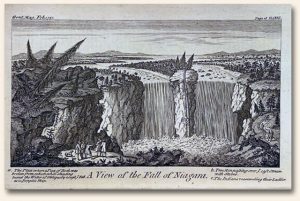 Plates include the Philadelphia State House (later to be known as Independence Hall), St. Philip’s Church in Charleston, the fort at Bunker’s Hill, Ben Franklin’s ‘Square of Squares’, the guillotine which beheaded Louis XVI and his wife, a slavery medal, and even a plate of the Garden of Eden. What I have just described only scratches the surface of the treasures these magazines hold.
Plates include the Philadelphia State House (later to be known as Independence Hall), St. Philip’s Church in Charleston, the fort at Bunker’s Hill, Ben Franklin’s ‘Square of Squares’, the guillotine which beheaded Louis XVI and his wife, a slavery medal, and even a plate of the Garden of Eden. What I have just described only scratches the surface of the treasures these magazines hold.
The “Gentleman’s Magazine” is a little gem packed with all the history one would want to find from the 18th century. Each issue typically has about 40 pages, and measuring about 5 by 8 inches, they take up very little room in a collection.
Perhaps best of all, The Gentleman’s Magazine is an accessible title as our inventory contains thousands of issues, and at prices far below what would be found in comparable American & British newspapers of the same period.
There can be little excuse for holding back on buying the best events in American history if one is willing to add this famous & successful title to their collection. And there certainly will be a time when even this title will become quite scarce as others discover it as a treasure just begging to be collected.
The American Dream at Work…
June 10, 2021 by Laura Heilenman · Leave a Comment
What is the American Dream? We often hear that phrase bantered about but people seem to have differing views of just what it means. I was recently reading an article by a young woman in her early thirties with 2 small children. She and her husband had decided to move to Hawaii for a simpler life… a life not cluttered with as many things or as many stresses. Her final words on the subject were, “we chose to give up the American Dream”. WHAT !?! She had me until that final statement. Is it possible she could have grown up in this country and not actually know what the American Dream is !?! Could she have been deluded to believe the American Dream is about things and schedules and the size of your home? Ok … I’ve taken a breath and calmed down a bit. One of the blessings we have as students of American History is a foundational knowledge of what our Founders believed the American Dream was. Let me allow them to speak for themselves:
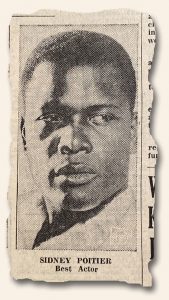 “We hold these truths to be self-evident, that all men are created equal, that they are endowed by their Creator with certain unalienable Rights, that among these are Life, Liberty and the pursuit of Happiness.”
“We hold these truths to be self-evident, that all men are created equal, that they are endowed by their Creator with certain unalienable Rights, that among these are Life, Liberty and the pursuit of Happiness.”
The pursuit of Happiness … very different from guaranteed happiness. In many ways, the ability to pursue something is a far greater gift than it being given to you. There is often joy and a deep sense of accomplishment in the striving. Being handed something on a silver platter lacks the ability to give the same growth and satisfaction.
On April 14, 1964, The Leominster Enterprise wrote a front page article covering the Academy Award winners from the night before. One of these stars was Sidney Poitier, “who struggled from the poverty of a Caribbean tomato farm … Poitier, who was born in Florida, but who was raised on a tomato farm in Nassau, was unable to addend school until he was 11 years old. Two years later he was forced to help support his family. When he was 16 he moved to New York City with a series of odd jobs, including ditch digger, store clerk, pin-boy in a bowling alley and longshoreman. He finally joined the American Negro Theater and worked as a janitor in exchange for acting lessons. He advanced to small roles and moved on to stage parts…”.
Now there is the American Dream at work!
PS. That evening, Sidney Poitier became the 1st black man to win an Academy Award – all due to his PURSUIT of the American Dream.
Contemplating Memorial Day in light of the last 15 months…
May 31, 2021 by GuyHeilenman · Leave a Comment
I’m embarrassed. Last year, in the midst of the pandemic, I was so consumed by “in the moment” issues I neglected to take the time on Memorial Day to be thankful for “those who have gone before us” – specifically, the men and women who gave their lives so those of us who reside in the United States could live in safety… freedom… hope – in a land where the ideals of the pursuit of happiness, equality, freedom of speech, etc., while not yet fully realized, were and continue to be part an parcel of the dream we call America. Starting with a revisit of a post from a few years ago, this year I’m committed to being more thankful for others and less self-consumed. Hopefully you’ll enjoy the following as much as I have while preparing this post:
Memorial Day… The Blue and the Gray…
We recently discovered an original issue of The Atlantic Monthly for September, 1867, which contained the earliest nationally distributed printing (and maybe the first ever) of ‘The Blue and the Gray,” by Francis Miles Finch. Although Memorial Day had not been officially proclaimed (via General Order #11, May 5, 1868), the practice of placing flowers and wreaths on the tombstones if the fallen was somewhat common. What was uncommon was the act of a group of women in Columbus, Mississippi, which is best described in the preface to Finch’s poem (quoted from the New York Tribune):
“The women of Columbus, Mississippi, animated by nobler sentiments than are many of their sisters, have shown themselves impartial in their offerings made to the memory of the dead. They strewed flowers alike on the graves of the Confederate and of the National soldiers.”
In recognition of Memorial Day, please enjoy the full text of this grand expression of appreciation for those who have fallen in battle – be they blue or gray:
Two additional Memorial Day themed posts from the past are:
Perhaps not a perfect system, but… Happy Memorial Day!
A simple reflection on Memorial Day…
Many Thanks to Give…
May 3, 2021 by Laura Heilenman · Leave a Comment
 My family often jokes with me (maybe about me ) when they say, “she can use Disney World as an example for anything.” They aren’t wrong and have accurately pegged me as a bit of a Disney fanatic. I won’t bore you with all the reasons I have for loving this place but I will tell you how it came to mind today as I was perusing an issue published by Frederick Douglass. For those of you who have visited Disney World or more specifically Epcot, I hope you have experienced Spaceship Earth. I never tire of riding this attraction and hearing Dame Judy Dench recount mankind’s history of communication to me as I gaze at the vignettes on each side of my “time machine”. At one point, she is describing how, since the invention of papyrus, knowledge is able to be kept and shared more easily and so civilization advances more rapidly until …
My family often jokes with me (maybe about me ) when they say, “she can use Disney World as an example for anything.” They aren’t wrong and have accurately pegged me as a bit of a Disney fanatic. I won’t bore you with all the reasons I have for loving this place but I will tell you how it came to mind today as I was perusing an issue published by Frederick Douglass. For those of you who have visited Disney World or more specifically Epcot, I hope you have experienced Spaceship Earth. I never tire of riding this attraction and hearing Dame Judy Dench recount mankind’s history of communication to me as I gaze at the vignettes on each side of my “time machine”. At one point, she is describing how, since the invention of papyrus, knowledge is able to be kept and shared more easily and so civilization advances more rapidly until …
“Rome falls, and the great Library of Alexandria in Egypt is burned. Much of our learning is destroyed—lost forever… or so we think. It turns out there are copies of some of these books in the libraries of the Middle East, being watched over by Arab and Jewish scholars. Call it the first backup system. The books are saved, and with them our dreams of the future.”
I get shivers every time I hear those words… so much knowledge… so much history… so many pages. Just now, as I pause to admire this precious Frederick Douglass paper lying on my desk, I am overwhelmed with gratitude for all the people we, the collectors of historic newspapers, have to thank for watching over the issues that later end up in our hands. Precious treasures of knowledge and history handed off to us, if even for a moment, to guard for future generations.
Inspiration from Days Gone by…
April 5, 2021 by Laura Heilenman · Leave a Comment
I heard an interesting quote the other day: “Long after the medals go into a box and the trophies have a layer of dust on them, will your speech still be having an impact on the audience you gave it to?” (Heather Neumann) Ironically, Heather’s statement had the impact it appears she wanted. As I contemplated her statement as I wrote this post, I was curious about who had made a lasting impact on this day throughout the ages, hoping to glean a bit of inspiration for myself. Here are a few that caught my eye.
 Having been raised by a mother who took our health seriously, I was encouraged from a very young age to” take Vitamin C at the 1st sign of a cold”. Who do I have to thank for this bit of wisdom besides my mother? On 4/5/1932, the New York Times covered research done by Charles Glen King. Prof. King isolated the compound for Vitamin C for the 1st time… over 30 years before my mother began her diligent training. Charles’ work continued in the nutritional field to help any with open ears to a step into a healthier life… continuing to positively impact the bodies of mankind.
Having been raised by a mother who took our health seriously, I was encouraged from a very young age to” take Vitamin C at the 1st sign of a cold”. Who do I have to thank for this bit of wisdom besides my mother? On 4/5/1932, the New York Times covered research done by Charles Glen King. Prof. King isolated the compound for Vitamin C for the 1st time… over 30 years before my mother began her diligent training. Charles’ work continued in the nutritional field to help any with open ears to a step into a healthier life… continuing to positively impact the bodies of mankind.
On April 5, 1990, the LA Times covered the death of legendary jazz vocalist Sarah Vaughn. The University of Central Florida’s website asserts … music impacts the brain by “reducing stress, pain and symptoms of depression as well as improving cognitive and motor skills, spatial-temporal learning and neurogenesis”. Perhaps the phrase, “music calms the savage beast” is not just an old wives saying enabling Sarah’s music to bring a sense of peace and wellbeing to the many who continue to listen to her, bringing far more lasting impact than her 4 Grammy’s and lifetime achievement award… continuing to positively impact the minds of mankind.
In April of 1985, USA Today covered Michael Jordon’s work with Special Olympics. Most of us can only imagine how hard it must be for someone famous and in the perpetual limelight to tear the focus off of themselves and place it on others. Often times we judge the motives of these people even when they are trying to do a good thing. Perhaps we should take their good deeds at face value and appreciate the fact that when we do good for others, both the giver and receiver are uplifted. In this case, Michael’s efforts to reach out to others has a lasting impact on the his life, the lives he touched and all of us watching if we can put our skepticism aside… continuing to positively impact the souls of mankind.
While I am sure I will never sing like Sarah Vaughn or discover a great scientific breakthrough, I do have daily opportunities to bless others. I am sure these will never make it into USA Today or the LA Times and that is okay however, if by chance they would, sometimes those trophies in a box can inspire the next person.
The Eyes are the Windows to the Soul … But not for Adolph Hitler
March 25, 2021 by Laura Heilenman · Leave a Comment
 Sometimes it is the little things that catch your eye and not the major content of a newspaper. Two weeks ago, as I was photographing an issue for our most recent catalog, a tiny article at the bottom of the front page gave me pause and has been on my mind ever since. What began as a write up for an adorable vintage Disney ad turned dark. The Eyes are the Window to the Soul … or so they say. During the end of July, 1939, 3 English girls traveled to Germany to perform a tap dance for Adolf Hitler. Upon their return, they reported how delightful he was and that they liked his eyes. This reporting took place one month before Hitler invaded Poland beginning WWII and only one year before the Nazis took their fight to the 3 girl’s homeland. Perhaps the eyes are the window to the soul however, the ability to read them is also necessary. Reports such as these may not be the reason we purchase an issue but, they do give us an unprecedented window into a culture and are often the more valuable treasure.
Sometimes it is the little things that catch your eye and not the major content of a newspaper. Two weeks ago, as I was photographing an issue for our most recent catalog, a tiny article at the bottom of the front page gave me pause and has been on my mind ever since. What began as a write up for an adorable vintage Disney ad turned dark. The Eyes are the Window to the Soul … or so they say. During the end of July, 1939, 3 English girls traveled to Germany to perform a tap dance for Adolf Hitler. Upon their return, they reported how delightful he was and that they liked his eyes. This reporting took place one month before Hitler invaded Poland beginning WWII and only one year before the Nazis took their fight to the 3 girl’s homeland. Perhaps the eyes are the window to the soul however, the ability to read them is also necessary. Reports such as these may not be the reason we purchase an issue but, they do give us an unprecedented window into a culture and are often the more valuable treasure.
William Cowper speaks out against slavery (1791)… They put it in print…
February 25, 2021 by GuyHeilenman · Leave a Comment
Thank goodness “cancel culture” did not exist (at least in [Wilbur]force) back in 18th century.
Flashback to the late 17oo’s… Although slavery had been part and parcel of many cultures for thousands of years, and was certainly woven throughout all aspects of life and commerce in Great Britain, some were staunchly against the practice and had the courage to fight for those whose skin color did not match their own. One such person who was particularly outspoken in this regard was the popular and well-respected poet/hymnologist William Cowper. Although taking such a stand was both an affront and a danger to the political and social mores of the day, he (and others with similar convictions) were permitted to speak, and in the long-run, the world’s view was eventually transformed. How do we know? They (actually) put it in print!
The following excerpt from one of his anti-slavery poems was printed in the Columbian Centinel dated June 16, 1791: